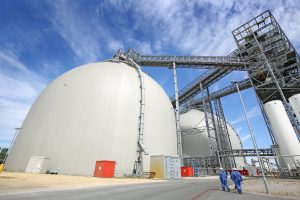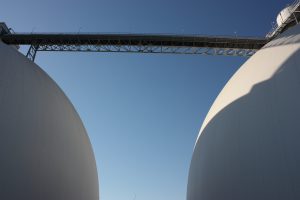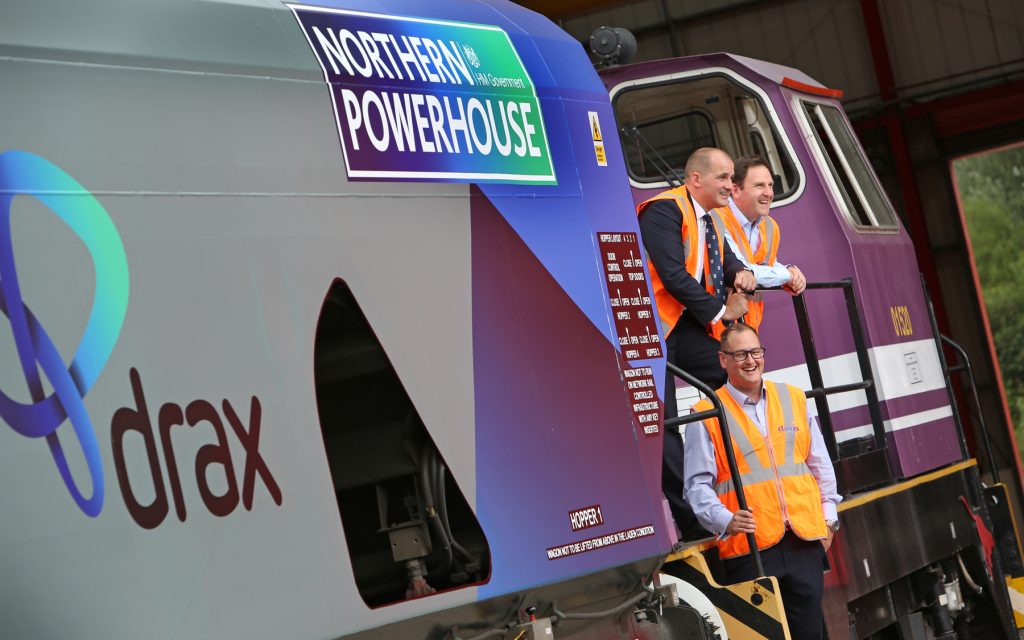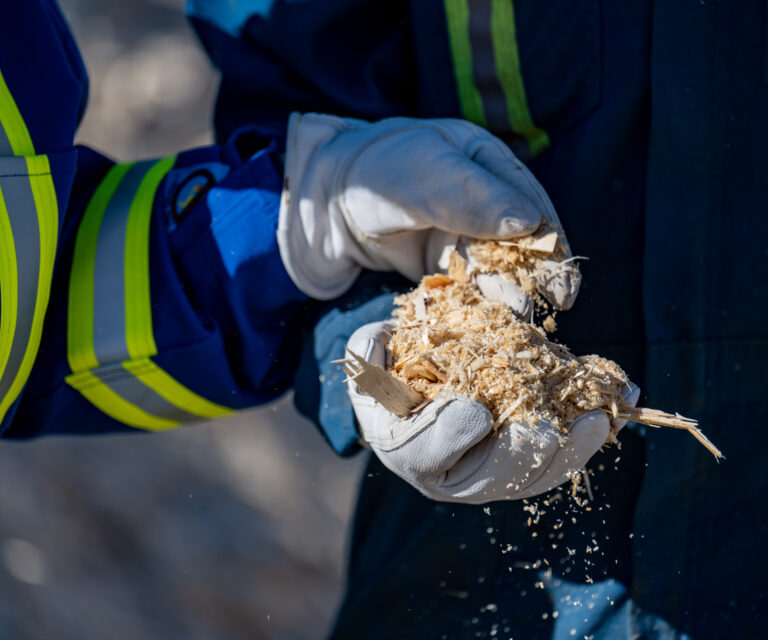Since it upgraded half of the power station near Selby in North Yorkshire to use sustainable biomass instead of coal, Drax has transformed its business to become Europe’s biggest decarbonisation project and the UK’s largest single site renewable power generator.
Key to its success is its supply chain – including the development of bespoke train wagons able to transport compressed wood pellets in the quantities needed to the power station.
Drax’s rail wagons, the first of their kind in the world, were designed and developed by Lloyd’s Register Rail (Ricardo) and WH Davis – the UK’s last independent freight wagon manufacturer.
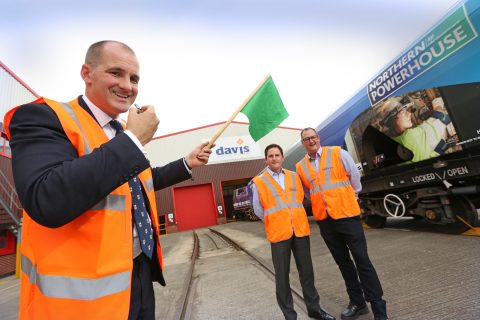
Work is now being carried out at Davis Wagon Services’ facilities (a subsidiary of WH Davis) to re-brand all 225 of Drax’s rail wagons, complete with new Northern Powerhouse branding.
Drax is a member of the government’s Northern Powerhouse initiative, which is aimed at boosting the region’s economy by investing in skills, innovation, transport and culture.
Jake Berry, Northern Powerhouse Minister said:
“The development of Drax’s train wagons is a Northern Powerhouse success story – I’m delighted to unveil the first of the newly branded wagons.
“The energy sector has been and will continue to be a major source of jobs and economic opportunity in the North of England. It is worth over £5bn to the North and the region has more low carbon jobs per 1,000 employees than anywhere else in England.”
Andy Koss, Drax Power CEO, said:
“With these trains delivering up to 20,000 tonnes of biomass each day, we are now powering millions of homes and businesses across the UK with reliable, renewable electricity, whilst generating over £500m for the northern economy and supporting more than 6,000 jobs in the region – including some here at Davis Wagon Services’ facilities.
“We have invested £700m transforming the business from coal to biomass, including the development of an entirely new supply chain, and these rail wagons are a vital part of that investment.
“Our biomass comes into the ports on the east and west coasts from North America and Europe, and is brought to the power station by rail, because it is more efficient than road transportation – helping us to make carbon savings of more than 80 per cent compared to when we used coal to generate electricity.”
John Hall, Managing Director of Davis Wagon Services Ltd, said:
“Our parent company is the last UK rail freight manufacturer, and winning the contract with Drax firstly to develop and build these unique biomass wagons and now in maintaining them, has enabled us to retain a number of staff in skilled jobs and invest £850,000 in our facilities here in the North.
“We will be working with Drax as it rebrands all of its wagons over the coming two years, re-wrapping them with the new branding as part of a rolling maintenance programme.”
ENDS
Media contacts
Ali Lewis
Drax Group Head of News
E: ali.lewis@drax.com
T: 07712670888
Jessica Gorton
Drax Group Press Officer
E: jessica.gorton@drax.com
T: 0203 9434305
Editor’s Notes
- 65% of the electricity Drax produced in 2017 was renewable – enough to power four million households.
- Having upgraded three generating units to use biomass instead of coal, Drax is in the process of converting a fourth generating unit to use biomass which should be completed this summer. It has also submitted plans to repower its remaining two coal units with gas power and battery storage which are being considered by the Planning Inspectorate.
- The majority of the biomass Drax uses comes from North America and Europe on ships to ports on the east and west coasts of the UK (Immingham, Hull, Port of Tyne and Liverpool). It is then taken to the power station from the ports by rail.
- Drax has an average of 17 biomass trains arriving at the power station per day (over a six-day working week) in order to supply the pellets needed to generate and supply 15 per cent of the UK’s renewable electricity.
- Each train contains sufficient fuel to provide 815 houses in the UK with enough electricity for a year.
- The fuel is transported to Drax via rail rather than road, to further reduce carbon emissions, as it is more efficient than road transportation. Using rail saves approximately 270,000 truck journeys per year and is estimated to save 32,622.50 tonnes of C02 per year
- Independent research by Oxford Economics using 2016 data showed that Drax supported over 18,500 jobs across the country – more than 6,000 of which were across the North of England (Yorkshire and Humber, North West and North East). In addition Drax generated £577m for the Northern Powerhouse regional economy and £1.7 billion for the whole of the UK.
About Drax
Drax Group plc plays a vital role in helping change the way energy is generated, supplied and used. Its 2,300-strong staff operate across three principal areas of activity – electricity generation, electricity sales to business customers and compressed wood pellet production.
The Group includes:
Drax Power Ltd, which operates the largest power station in the UK, based at Selby, North Yorkshire and supplies 7 percent of the country’s electricity needs. The energy firm converted from burning coal to become a predominantly biomass-fuelled electricity generator. Drax is the biggest single site renewable generator in the UK and the largest decarbonisation project in Europe.
Haven Power, based in Ipswich, supplies electricity to large Industrial and Commercial sector businesses.
Opus Energy, based in Oxford, Northampton and Cardiff, provides electricity and gas to small and medium sized (SME) businesses.
Drax Biomass, is based in the US and manufactures compressed wood pellets produced from sustainably managed working forests, supplying fuel used by Drax Power Station in North Yorkshire to generate flexible, renewable power for the UK’s homes and businesses.
For more information visit www.drax.com/us




